- Home
- Paulo Coelho
Veronika Decides to Die: A Novel of Redemption Page 9
Veronika Decides to Die: A Novel of Redemption Read online
Page 9
The tangle of laws created such confusion that the Son ended up nailed to a cross. It was no simple trial; he was passed from Ananias to Caiphas, from the priest to Pilate, who alleged that there were insufficient laws in the Roman code. From Pilate to Herod, who, in turn, alleged that the Jewish code did not permit the death sentence. From Herod back to Pilate again, who, looking for a way out, offered the people a juridical deal: He had the Son beaten and then displayed to the people with his wounds, but it didn't work.
Like prosecutors nowadays Pilate decided to save himself at the expense of the condemned man: he offered to exchange Jesus for Barabbas, knowing that, by then, justice had become a grand spectacle requiring a denouement: the death of the prisoner.
Finally Pilate used the article of law that gave the judge, and not the person being judged, the benefit of the doubt. He washed his hands, which means: "I'm not quite sure either way." It was just another ruse to preserve the Roman juridical system without injuring relations with local magistrates, and even transferring the weight of the decision onto the people, just in case the sentence should cause any problems, and some inspector from the imperial capital came to see for himself what was going on.
Justice. Law. Although both were vital in order to protect the innocent, they did not always work to everyone's liking. Mari was glad to be far from all that confusion, although tonight, listening to the piano, she was not quite so sure that Villete was the right place for her.
"If I were to decide once and for all to leave here, I wouldn't go back to the law. I'm not going to spend my time with crazy people who think they're normal and important, but whose sole function in life is to make everything more difficult for others. I'll be a seamstress, an embroiderer, I'll sell fruit outside the municipal theater. I've already made my contribution to the futile insanity of the law."
In Villete you were allowed to smoke, but not to stub your cigarette out on the lawn. With great pleasure she did what was forbidden, because the great advantage of being there was not having to respect the rules and not even having to put up with any major consequences if you broke them.
She went over to the front gate. The guard--there was always a guard there, after all, that was the law--nodded to her and opened the door.
"I'm not going out," she said.
"Lovely piano music," said the guard. "I've listened to it nearly every night."
"It won't last much longer," she said and walked rapidly away so as not to have to explain.
Mari remembered what she had read in the young girl's eyes the moment she had come into the refectory: fear.
Fear. Veronika might feel insecurity, shyness, shame, constraint, but why fear? That was only justifiable when confronted by a real threat: ferocious animals, armed attackers, earthquakes, but not a group of people gathered together in a refectory.
But human beings are like that, she thought. We've replaced nearly all our emotions with fear.
And Mari knew what she was talking about, because that was what had brought her to Villete: panic attacks.
In her room Mari had a veritable library of articles on the subject. Now people talked about it openly, and she had recently seen a German television program in which people discussed their experiences. In that same program, a survey revealed that a significant percentage of the population suffers from panic attacks, although most of those affected tried to hide the symptoms, for fear of being considered insane.
But at the time when Mari had her first attack, none of this was known. It was absolute hell, she thought, lighting another cigarette.
The piano was still playing; the girl seemed to have enough energy to play all night.
A lot of the inmates had been affected by the young woman's arrival in the hospital, Mari among them. At first she had tried to avoid her, afraid to awaken the young woman's desire to live; since there was no escape, it was better that she should keep on wanting to die. Dr. Igor had let it be known that, even though she would continue to be given daily injections, her physical condition would visibly deteriorate and there would be no way of saving her.
The inmates had understood the message and kept their distance from the condemned woman. However, without anyone knowing quite why, Veronika had begun fighting for her life, and the only two people who approached her were Zedka, who would be leaving tomorrow and didn't talk that much anyway, and Eduard.
Mari needed to have a word with Eduard; he always respected her opinions. Did he not realize he was drawing Veronika back into the world, and that that was the worst thing he could do to someone with no hope of salvation?
She considered a thousand ways of explaining the situation to him, but all of them would only make him feel guilty, and that she would never do. Mari thought a little and decided to let things run their normal course. She was no longer a lawyer, and she did not want to set a bad example by creating new laws of behavior in a place where anarchy should reign.
But the presence of the young woman had touched a lot of people there, and some were ready to rethink their lives. At one of the meetings with the Fraternity, someone had tried to explain what was happening. Deaths in Villete tended to happen suddenly, without giving anyone time to think about it, or after a long illness, when death is always a blessing.
The young woman's case, though, was dramatic because she was so young and because she now wanted to live again--something they all knew to be impossible. Some people asked themselves, What if that happened to me? I do have a chance to live. Am I making good use of it?
Some were not bothered with finding an answer; they had long ago given up and now formed part of a world in which neither life nor death, space or time, existed. Others, however, were being forced to think hard, and Mari was one of them.
Veronika stopped playing for a moment and looked out at Mari in the garden. She was wearing only a light jacket against the cold night air? Did she want to die?
NO, I WAS the one who wanted to die.
She turned back to the piano. In the last days of her life, she had finally realized her grand dream: to play with heart and soul, for as long as she wanted and whenever the mood took her. It didn't matter to her that her only audience was a young schizophrenic; he seemed to understand the music, and that was what mattered.
Mari had never wanted to kill herself. On the contrary, five years before, in the same movie theater she had visited today, she had watched, horrified, a film about poverty in El Salvador and thought how important her life was. At that time--with her children grown up and making their way in their own professions--she had decided to give up the tedious, unending job of being a lawyer in order to dedicate the rest of her days to working for some humanitarian organization. The rumors of civil war in the country were growing all the time, but Mari didn't believe them. It was impossible that, at the end of the twentieth century, the European Community would allow a new war at its gates.
ON THE other side of the world, however, there was no shortage of tragedies, and one of those tragedies was El Salvador's, where starving children were forced to live on the streets and turn to prostitution.
"It's terrible," she said to her husband, who was sitting in the seat next to her.
He nodded.
Mari had been putting off the decision for a long time, but perhaps now was the moment to talk to him. They had been given all the good things that life could possibly offer them: a home, work, good children, modest comforts, interests, and culture. Why not do something for others for a change? Mari had contacts in the Red Cross, and she knew that volunteers were desperately needed in many parts of the world.
She was tired of struggling with bureaucracy and law suits, unable to help people who had spent years of their lives trying to resolve problems not of their own making. Working with the Red Cross, though, she would see immediate results.
She decided that, when they left the movie theater, she would invite her husband for a coffee so that they could discuss the idea.
Just as a Salvadoran gov
ernment official appeared on screen to offer a bored excuse for some new injustice, Mari suddenly noticed her heart beating faster.
She told herself it was nothing. Perhaps the stuffy atmosphere in the movie was getting to her; if the symptoms persisted she would go out to the foyer to get a breath of fresh air.
But events took on their own momentum; her heart began beating faster and faster, and she broke out in a cold sweat.
She felt afraid and tried hard to concentrate on the film, in an attempt to dispel any negative thoughts, but realized she could no longer follow what was happening on the screen. Mari could see the images and the subtitles, but she seemed to have entered a completely different reality, where everything going on around her seemed strange and out of kilter, as if taking place in a world she did not know.
"I don't feel well," she said to her husband.
She had put off making that remark as long as possible, because it meant admitting that there was something wrong, but she could not hold out any longer.
"Let's go outside," he said.
When he took his wife's hand to help her to her feet, he noticed it was ice cold.
"I don't think I can get that far. Please tell me what's happening to me."
Her husband felt afraid too. Sweat was pouring down Mari's face, and there was a strange light in her eyes.
"Keep calm. I'll go out and call a doctor."
She was gripped by despair. What he said made absolute sense, but everything--the theater, the semidarkness, the people sitting side by side staring up at the brilliant screen--all of it seemed so threatening. She was certain she was alive, she could even touch the life around her as if it were something solid. And that had never happened to her before.
"On no account leave me here alone. I'll get up and go out with you, but take it slowly."
They both made their apologies to the people in the same row and began walking to the exit at the back of the cinema. Mari's heart was now beating furiously, and she was certain, absolutely certain, that she would never get out of that place. Everything she did, every gesture she made--placing one foot in front of the other, saying "Excuse me," holding on to her husband's arm, breathing in and out--seemed terrifyingly conscious and deliberate.
She had never felt so frightened in her life. "I'm going to die right here in this movie theater."
And she was convinced that she knew what was happening because, many years before, a friend of hers had died in a movie theater of a cerebral aneurism.
Cerebral aneurisms are like time bombs. They are tiny varicose veins that form along the arteries--like the ballooning you get on worn tires--and they can remain there undetected during a whole lifetime. No one knows they've got an aneurism, unless it's discovered accidentally--for example, after a brain scan carried out for other reasons--or at the moment when it actually ruptures, flooding everything with blood, leaving the person in an immediate state of coma, usually followed by death.
While she was walking down the aisle of the dark theater, Mari remembered the friend she had lost. The strangest thing, though, was the effect this ruptured aneurism was having on her perception. She seemed to have been transported to a different planet, seeing each familiar thing as if for the first time.
And then there was the terrifying, inexplicable fear, the sheer panic of being alone on that other planet: Death.
I must stop thinking. I'll pretend that everything's all right and then everything will be.
She tried to act naturally, and for a few seconds the sense of oddness diminished. The two minutes that elapsed between first feeling the palpitations and reaching the exit with her husband were the most terrifying two minutes of her life.
When they reached the brightly lighted foyer, everything seemed to start up again. The colors were so garish, the noises from the street seemed to rush in on her from all sides, and everything seemed utterly unreal. She started to notice certain details for the first time; for example, the clarity of vision that covers only the small area on which we fix our gaze, while the rest remains completely unfocused.
There was more. She knew that everything she could see around her was just a scene created by electrical impulses inside her brain, using light impulses that passed through a gelatinous organ called the eye.
No, she must stop thinking. That's how she could be brought to sanity.
By then her fear of an aneurism had passed; she had managed to get out of the theater and was still alive. The friend who had died, on the other hand, never even had time to leave her seat.
"I'll call an ambulance," said her husband, when he saw his wife's ashen face and bloodless lips.
"Call a taxi," she said, hearing the sounds leaving her mouth, conscious of the vibration of each vocal cord.
Going to a hospital would mean accepting that she really was seriously ill, and Mari was determined to do her utmost to restore everything to normality.
They left the foyer, and the icy cold air seemed to have a positive effect; Mari recovered some control over herself, although the inexplicable feelings of panic and terror persisted. While her husband was desperately trying to find a taxi, which were scarce at that time of day, she sat down on the curb and tried not to look at her surroundings: the children playing, the buses passing, the music coming from a nearby street fair--all seemed absolutely surreal, frightening, alien.
Finally a taxi appeared.
"To the hospital," said her husband, helping his wife in.
"Please, let's just go home," she said. She didn't want to be in any more strange places; she was desperately in need of familiar, ordinary things that might diminish the fear she was feeling.
While the taxi was driving them home, her heart rate gradually slowed, and her temperature began to return to normal.
"I'm beginning to feel better," she said to her husband. "It must have been something I ate."
When they reached their house, the world again seemed exactly as it had been since her childhood. When she saw her husband go over to the phone, she asked him what he was doing.
"I'm going to call a doctor."
"There's no need. Look at me--I'm fine."
The color had returned to her cheeks, her heart was beating normally, and the uncontrollable fear had vanished.
Mari slept heavily that night and awoke convinced that someone must have put some drug in the coffee they had drunk before they went into the theater. It was a dangerous prank, and she was fully prepared, at the end of the afternoon, to call the prosecutor and go to the bar to try and find the person responsible.
She went to work, read through several pending lawsuits, and tried to occupy herself with various other tasks, for the experience of the previous day had left a residue of fear, and she wanted to prove to herself that it would never happen again.
She discussed the film on El Salvador with one of her colleagues and mentioned in passing that she was fed up with doing the same thing every day: "Perhaps it's time I retired."
"You're one of the best lawyers we've got," said the colleague. "Besides, law is one of the few professions where age is in your favor. Why not take a long vacation instead? I'm sure you'd come back to work with renewed energy."
"I want to do something completely different with my life. I want to have an adventure, help other people, do something I've never done before."
The conversation ended there. She went down to the square, had lunch in a more expensive restaurant than the one she normally went to, and returned to the office early. That moment marked the beginning of her withdrawal.
The rest of the employees had still not come back, and Mari took the opportunity to look over the work still on her desk. She opened the drawer to take out the pencil she always kept in the same place, and she couldn't find it. For a fraction of a second, it occurred to her that her failure to put the pencil back in its proper place was an indication that she was perhaps behaving oddly.
That was enough to make her heart start pounding again, and the terror of t
he previous night returned in full force.
Mari was frozen to the spot. The sun was coming in through the shutters, lending a brighter, more aggressive tone to everything around her, but she again had the feeling that she was about to die at any minute. It was all so strange; what was she doing in that office?
I don't believe in you, God, but please, help me.
Again she broke out in a cold sweat and realized that she was unable to control her fear. If someone came in at that moment, they would notice her frightened eyes, and she would be lost.
Cold air.
The cold air had made her feel better the previous night, but how could she get as far as the street? Once more she was noticing each detail of what was happening to her--her breathing rate (there were moments when she felt that if she did not make a special effort to inhale and exhale, her body would be incapable of doing so itself), the movement of her head (the images succeeded one another as if there were television cameras whirring inside it), her heart beating faster and faster, her body bathed in a cold, sticky sweat.
And then the terror, an awful, inexplicable fear of doing anything, of taking a single step, of leaving the chair she was sitting in.
It will pass.
It had passed last time, but now she was at work; what could she do? She looked at the clock, and it seemed to her an absurd mechanism, two needles turning on the same axis, indicating a measurement of time that no one had ever explained. Why twelve and not ten, like all our other measurements?
I mustn't think about these things, they make me crazy.
Crazy. Perhaps that was the right word to describe what was wrong with her. Summoning all her willpower, she got to her feet and made her way to the toilets. Fortunately the office was still empty, and, in a minute that seemed to last an eternity, she managed to reach them. She splashed her face with water, and the feeling of strangeness diminished, although the fear remained.
It will pass, she said to herself. Yesterday it did.
She remembered that, the day before, the whole thing had lasted about thirty minutes. She locked herself in one of the toilets, sat on the toilet seat, and put her head between her knees. That position, however, seemed only to amplify the sound of her heart beating, and Mari immediately sat up again.

 The Alchemist
The Alchemist Maktub
Maktub Like the Flowing River
Like the Flowing River The Winner Stands Alone
The Winner Stands Alone The Spy
The Spy By the River Piedra I Sat Down and Wept: A Novel of Forgiveness
By the River Piedra I Sat Down and Wept: A Novel of Forgiveness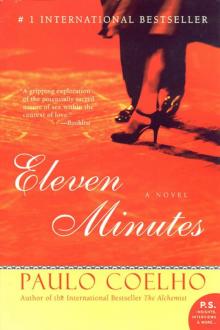 Eleven Minutes
Eleven Minutes Manuscript Found in Accra
Manuscript Found in Accra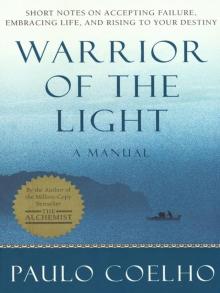 Warrior of the Light
Warrior of the Light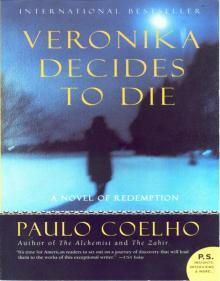 Veronika Decides to Die: A Novel of Redemption
Veronika Decides to Die: A Novel of Redemption The Devil and Miss Prym: A Novel of Temptation
The Devil and Miss Prym: A Novel of Temptation The Valkyries: An Encounter With Angels
The Valkyries: An Encounter With Angels Brida: A Novel
Brida: A Novel Fifth Mountain: A Novel
Fifth Mountain: A Novel Adultery
Adultery Inspirations
Inspirations The Archer
The Archer The Witch of Portobello
The Witch of Portobello The Pilgrimage
The Pilgrimage The Zahir
The Zahir Brida
Brida The Fifth Mountain
The Fifth Mountain Like the Flowing River: Thoughts and Reflections
Like the Flowing River: Thoughts and Reflections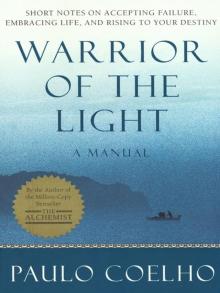 Manual of the Warrior of Light
Manual of the Warrior of Light By The River Piedra I Sat Down & Wept
By The River Piedra I Sat Down & Wept The Supreme Gift
The Supreme Gift Aleph
Aleph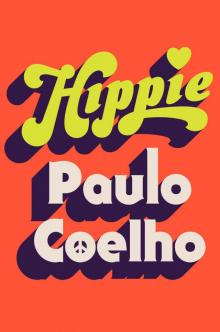 Hippie
Hippie Witch of Portobello
Witch of Portobello The Devil and Miss Prym
The Devil and Miss Prym The Alchemist - 10th Anniversary Edition
The Alchemist - 10th Anniversary Edition The Valkyries
The Valkyries